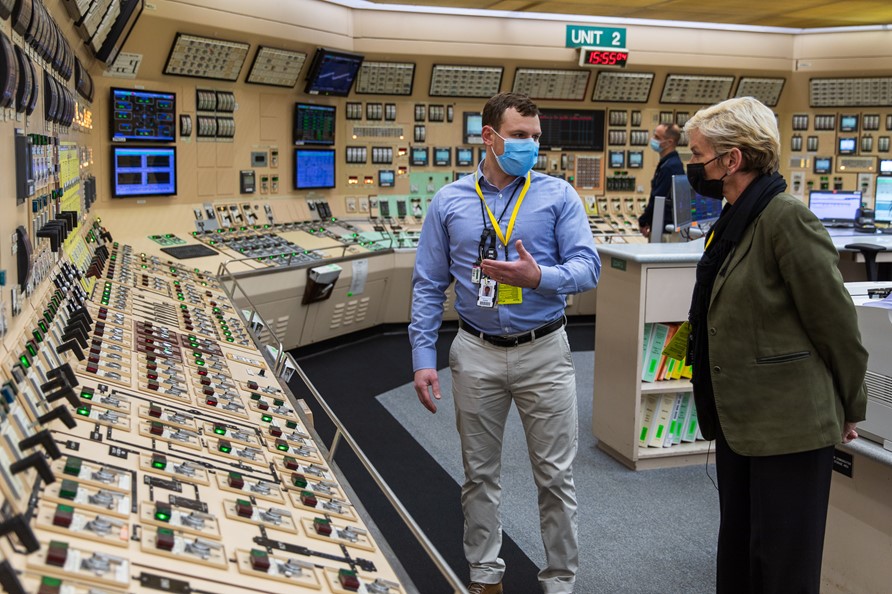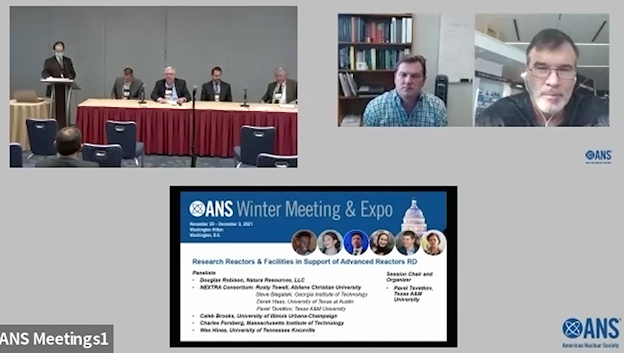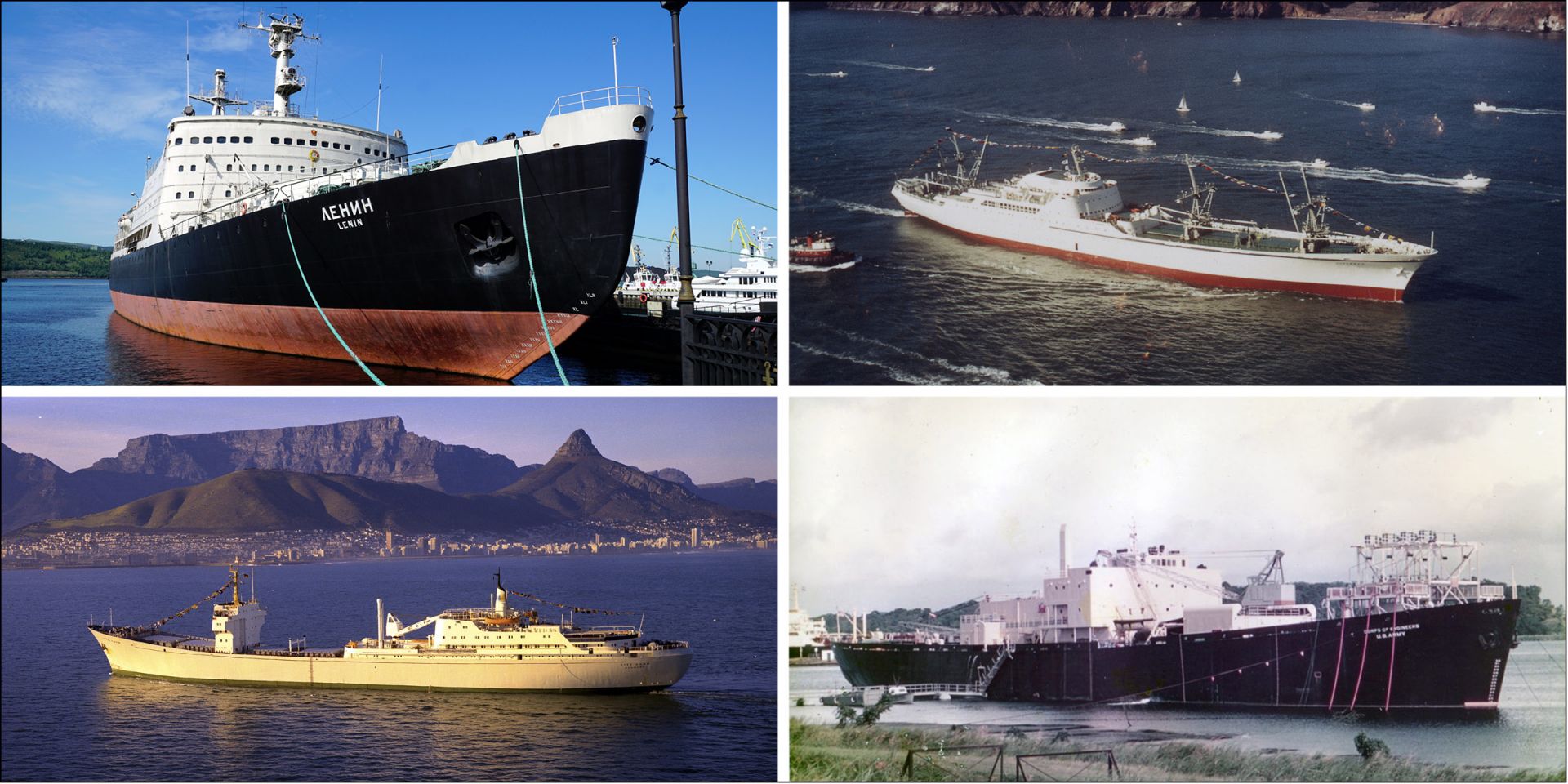Westinghouse submits eVinci microreactor plan to NRC

Westinghouse Electric Company has filed a pre-application regulatory engagement plan (REP) with the Nuclear Regulatory Commission for its eVinci microreactor, the company announced on Tuesday.
-3 2x1.jpg)
A message from Curtiss-Wright
High-Temperature neutron flux detectors for Generation IV reactors and SMRs

Westinghouse Electric Company has filed a pre-application regulatory engagement plan (REP) with the Nuclear Regulatory Commission for its eVinci microreactor, the company announced on Tuesday.

The Texas A&M Engineering Experiment Station (TEES) has installed the NuScale small modular reactor control room simulator at the Center for Advanced Small Modular and Micro Reactors (CASMR).
TEES performs collaborative research through universities, national laboratories, and state and federal agencies with the goal of finding solutions to global technical challenges.
First reported last week by S&P Global Platts but confirmed only yesterday, small modular reactor developer NuScale Power plans to go public via a merger with Spring Valley Acquisition Corporation, a special purpose acquisition company, or SPAC. (SPACs are shell corporations listed on a stock exchange with the purpose of acquiring or merging with a private company, effectively taking that company public without going through the standard initial public offering process.)
The Nuclear Regulatory Commission has extended, for the second time, the public comment period regarding preliminary language for a proposed rule setting out a risk-informed, technology-inclusive framework for the licensing and regulation of advanced reactors, according to a notice in the December 10 Federal Register.

Luria

Gonzalez
Reps. Anthony Gonzalez (R., Ohio) and Elaine Luria (D., N.Y.) have again teamed up to launch bipartisan pronuclear legislation in the House. On December 7, with Luria as cosponsor, Gonzalez unveiled the Accelerating Nuclear Innovation through Fee Reform Act (H.R. 6154), aimed at accelerating innovation and catalyzing private sector investment in advanced nuclear reactor technologies by eliminating Nuclear Regulatory Commission review fees for advanced reactor license applications, which could reach tens of millions of dollars, disincentivizing developers from bringing new technologies to market.

The Nuclear Regulatory Commission has approved the transfer of the Palisades nuclear power plant licenses from Entergy Nuclear Operations to Holtec International, as owner, and Holtec Decommissioning International (HDI), as decommissioning operator. Holtec and HDI intend to decommission the single-unit pressurized water reactor, located in Covert, Mich., under an accelerated schedule.

The Department of Energy’s Office of Nuclear Energy is soliciting applications from untenured, early career faculty members for the new Distinguished Early Career Program. Applicants must respond by February 2 with a plan that integrates research, education, and service under the terms of a funding opportunity announcement dated December 6 and announced by the DOE on December 7. The DOE anticipates granting up to four $625,000 awards, each with a five-year duration.

Nuclear thermal propulsion (NTP) is one technology that could propel a spacecraft to Mars and back, using thermal energy from a reactor to heat an onboard hydrogen propellant. While NTP is not a new concept, fuels and reactor concepts that can withstand the extremely high temperatures and corrosive conditions experienced in the engine during spaceflight are being designed now.
BWX Technologies announced on December 13 that it has delivered coated reactor fuels to NASA for testing in support of the Space Technology Mission Directorate’s NTP project. BWXT is developing two fuel forms that could support a reactor ground demonstration by the late 2020s, as well as a third, more advanced and energy-dense fuel for potential future evaluation. BWXT has produced a videoof workers processing fuel kernels in a glovebox.

Energy secretary Jennifer Granholm toured the Braidwood nuclear plant in Illinois last week as part of a statewide tour to promote the climate provisions in the recently passed trillion-dollar infrastructure law and the Build Back Better Act, over which the Senate continues to haggle.

Kandasamy
Daunting tasks are nothing new for Jhansi Kandasamy. Her record of accomplishments over three decades suggests that she is often the first to succeed where others fall short. “I like to be the first,” she said with a laugh.
Her latest first? Kandasamy was recently named Idaho National Laboratory’s net-zero director. She is charged with achieving net-zero carbon emissions for INL within the next 10 years and her plan is to be 75 percent toward that goal within the next five years.
John Wagner, INL director, announced the Net-Zero initiative on Earth Day 2021, and he acknowledged it won’t be easy. “I understand this is an audacious goal,” he said, “but overcoming significant national challenges is exactly what national laboratories were established to do.”

First-of-a-kind research reactors, demo reactors, and research facilities are being developed and sited on university campuses to support the broader deployment of advanced reactors. At the 2021 ANS Winter Meeting and Technology Expo, during a December 2 panel session titled “Research Reactors in Support of Advanced Reactor R&D,” several of these planned projects were discussed in detail—including a molten salt reactor in Texas and a high-temperature gas–cooled reactor in Illinois.
The session was sponsored by the Reactor Physics Division and organized and chaired by Pavel Tsvetkov, of Texas A&M University. A video of the session is available to registered Winter Meeting attendees.

Hinderstein
Corey Hinderstein has been sworn in as the deputy administrator for defense nuclear nonproliferation (DNN) of the Department of Energy’s National Nuclear Security Administration.
Confirmed by the U.S. Senate on November 30, Hinderstein now leads the NNSA’s efforts to help the U.S. government prevent, counter, and respond to global nuclear security threats. She was sworn in on December 6 by energy secretary Jennifer Granholm.
Learn more about Hinderstein and defense nuclear nonproliferation.

Four work crews have become qualified to operate the control room at the Hanford Site's Waste Treatment and Immobilization (VIT) Plant, which is targeted for operation in 2023.

In the early days of the development of nuclear power, a broad range of nuclear technologies and applications were explored. Among these developments were the use of nuclear propulsion for ships, both military and civilian, as well as a floating nuclear power plant. While the use of nuclear power for naval vessels, including submarines and surface ships, continued, most of the civilian uses of nuclear power on the water were ultimately terminated.
Recently, however, there has been a resurgence of interest in both floating nuclear power plants and the use of nuclear propulsion in the civilian sector. The renewed interest makes this a particularly timely moment to recount the initial developments in this area. Some of the early civilian nuclear vessels were discussed in two sessions during the June 2021 ANS Annual Meeting, “NS Savannah History” and “History of Non-Naval Nuclear Ship Power.” This article draws on the presentations from those sessions, the second of which was cochaired by the authors, as well as on other studies of the history of nuclear power.
The following newly published standard is available for purchase in the ANS Store:
ANSI/ANS-3.14-2021, Process for Infrastructure Aging Management and Life Extension of Nonreactor Nuclear Facilities (new standard)

Holahan
The Nuclear Regulatory Commission expects to publish its proposed rulemaking for nuclear power reactors transitioning to decontamination and decommissioning in early 2022, according to Patricia Holahan, director of the NRC’s Division of Decommissioning, Uranium Recovery, and Waste Programs. Holahan spoke during the December 1 opening plenary session of the topical meeting, Decommissioning, Environmental Science and Remote Technology 2021, held in conjunction with the 2021 ANS Winter Meeting and Technology Expo.
On November 3, the NRC commissioners approved the publication of the proposed rule in the Federal Register, subject to edits and comments by the commissioners. According to Holahan, who also serves as special assistant to the director of the NRC’s Division of Rulemaking, Environmental, and Financial Support, the NRC staff will incorporate the commission-directed changes into the proposed rule before it is published in the FR. The new rule is intended to make the decommissioning process more efficient by reducing the need for license exemptions and amendments.

The Department of Energy’s Office of Environmental Management (EM) is set to complete the 69th building demolition at the West Valley Demonstration Project early next year, when crews finish knocking down the last structure standing that supported operations at the former Main Plant Process Building.

Électricité de France recently announced the formation of an advisory board for NUWARD, France’s small modular reactor project. According to the company, the establishment of the International NUWARD Advisory Board (INAB) is a major step forward in support of the technology’s development.

The Thursday morning executive session at last week’s 2021 ANS Winter Meeting and Technology Expo brought together a group of influential nuclear-policy experts from the United States and abroad to discuss the roles nuclear can play in smoothing the pathway to net-zero emissions by 2050. Specific topics explored included the Clean Energy Ministerial (CEM) and its Nuclear Innovation Clean Energy (NICE) Future initiative, as well as last month’s COP26 climate conference in Glasgow. The session was moderated by Leah Parks, a Nuclear Regulatory Commission risk analyst and 2020 ANS Presidential Citation awardee.
The Department of Energy is dedicating $2 million to the establishment of a first-of-its-kind program to train undergraduate and graduate students in isotope research and development, production, and processing. Texas A&M University will serve as the Isotope Traineeship Coordination (ITC) site, collaborating with a team of 14 colleges and universities and three national laboratories: Argonne National Laboratory, Lawrence Livermore National Laboratory, and Los Alamos National Laboratory.